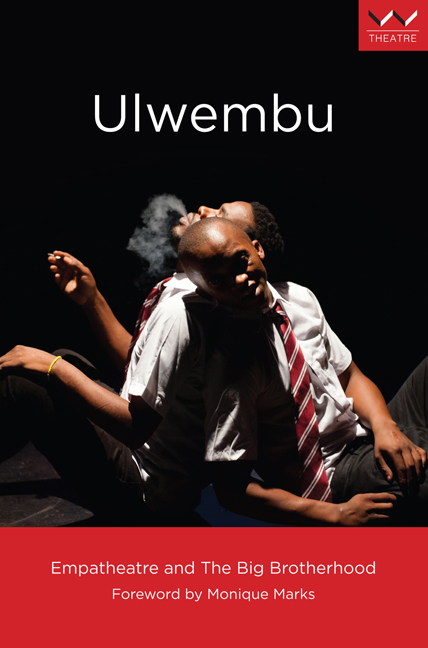Book contents
- Frontmatter
- Dedication
- Contents
- Acknowledgements
- Foreword
- Introduction
- Glossary and translation
- Images from production
- Ulwembu: the play script
- Prologue: Our story
- Scene 1 Behind the police station
- Scene 2 The police station, captain's office
- Scene 3 The school yard
- Scene 4 Portia's house
- Scene 5 Behind Emmanuel's sphaza shop
- Scene 6 Behind Emmanuel's sphaza shop
- Scene 7 The police station
- Scene 8 Emmanuel's sphaza shop
- Scene 9 Outside Emmanuel's sphaza shop
- Scene 10 Outside Emmanuel's sphaza shop
- Scene 11 Portia's house
- Scene 12 Bongani's house
- Scene 13 Outside Emmanuel's sphaza shop
- Scene 14 Outside Emmanuel's sphaza shop
- Scene 15 Bongani's house
- Scene 16 Outside Emmanuel's sphaza shop
- Scene 17 Sipho's room
- Scene 18 Emmanuel's sphaza shop
- Scene 19 Captain's office
- Scene 20 Behind the police station
- Scene 21 Bongani's house
- Scene 22 Portia's house
- Scene 23 Captain's office
- Scene 24 Emmanuel's sphaza shop
- Scene 25 On the street
- Epilogue: Our story
- Notes
- The Authors
Introduction
Published online by Cambridge University Press: 29 May 2019
- Frontmatter
- Dedication
- Contents
- Acknowledgements
- Foreword
- Introduction
- Glossary and translation
- Images from production
- Ulwembu: the play script
- Prologue: Our story
- Scene 1 Behind the police station
- Scene 2 The police station, captain's office
- Scene 3 The school yard
- Scene 4 Portia's house
- Scene 5 Behind Emmanuel's sphaza shop
- Scene 6 Behind Emmanuel's sphaza shop
- Scene 7 The police station
- Scene 8 Emmanuel's sphaza shop
- Scene 9 Outside Emmanuel's sphaza shop
- Scene 10 Outside Emmanuel's sphaza shop
- Scene 11 Portia's house
- Scene 12 Bongani's house
- Scene 13 Outside Emmanuel's sphaza shop
- Scene 14 Outside Emmanuel's sphaza shop
- Scene 15 Bongani's house
- Scene 16 Outside Emmanuel's sphaza shop
- Scene 17 Sipho's room
- Scene 18 Emmanuel's sphaza shop
- Scene 19 Captain's office
- Scene 20 Behind the police station
- Scene 21 Bongani's house
- Scene 22 Portia's house
- Scene 23 Captain's office
- Scene 24 Emmanuel's sphaza shop
- Scene 25 On the street
- Epilogue: Our story
- Notes
- The Authors
Summary
Ulwembu is a product of deep friendship and a love affair; an example of what happens when a chosen family of concerned citizens come together to truly listen and empathise with a social problem in its immediate environment.
Since 2014, the Big Brotherhood, a KwaMashu-based theatre company, has been working closely with acclaimed South African playwright Neil Coppen, local actress and ethnographer Mpume Mthombeni and me, an educational sociologist. Together we gathered oral histories of Durbanites and collectively transformed them into a captivating theatrical experience.
We developed an interdisciplinary theatre methodology which we have named Empatheatre, which brings together various forms of forum, documentary, verbatim research and applied theatre models. We hoped that through Empatheatre we would be able to share people's reallife stories to inspire and develop a greater empathy and kindness in spaces where there is conflict or injustice.
Ulwembu casts a wide net. It works in the fields of anthropology, sociology, criminology, health, law enforcement, mental health and, of course, theatre. It specifically shares the many stories of young whoonga (brown heroin) users in Durban and explores the role police and government services (such as health and social development) play in the lives of vulnerable youth in the city.
Whoonga (a concoction of B-grade heroin, rat poison and a variety of other toxic chemical components) has been plaguing KwaZulu-Natal communities for the past decade, yet only attracted public attention in recent years when it appeared in the inner city and surrounding suburbs of Durban. The devastating extent and complexity of the problem has been increasing at an alarming rate.
Government and city officials, non-governmental organisations (NGOs) and other groups have struggled to combine forces and react with the speed and efficiency needed to respond meaningfully to the crisis. Ultimately, as team/family, we wanted to do something to encourage a more humane response to street-level drug use and users, especially since some of the users we met were eight years old and living on the street with a severe heroin addiction.
When we began to look at the problem as a team (with vital mentorship from Professor Monique Marks and Dr Kira Erwin) we could see that treating users as psychologically abnormal was a significant problem. Instead, we began to focus on what was absent – meaningful care for and empathy with users.
- Type
- Chapter
- Information
- UlwembuEmpatheatre and the Big Brotherhood, pp. xvii - xxxPublisher: Wits University PressPrint publication year: 2018



